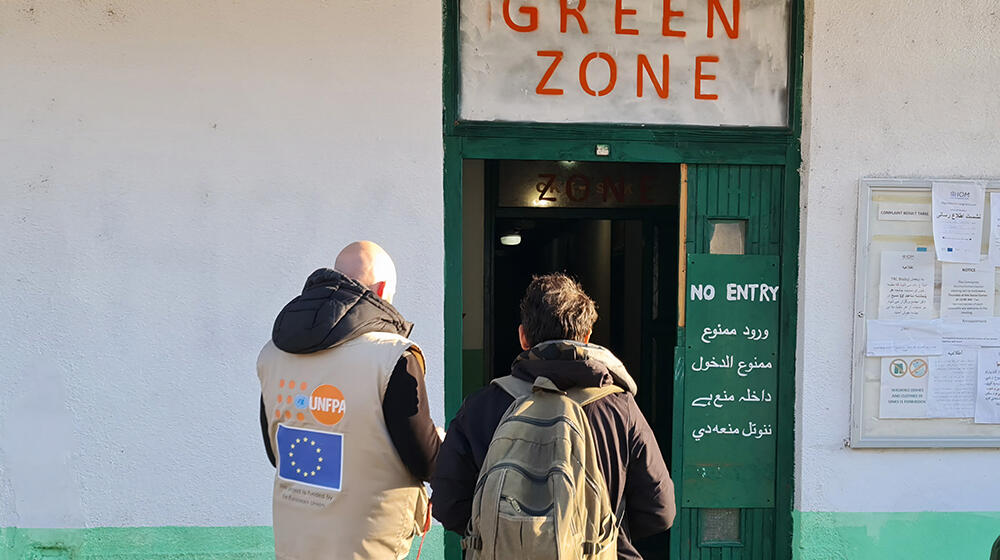Ever since he survived a sexual attack last year during his journey, having a sense and feel protection is important for 19-year-old Ali* from Afghanistan. As one of over 24,000 migrants and refugees who arrived in Bosnia and Herzegovina in 2022, Ali is among approximately 2,000 who still remain in the country.
Often traveling alone, without the presence and support of older family members, many young men on the move are exposed to abuse, exploitation, trafficking, and violence.
In response, UNFPA, together with the International Organization for Migration (IOM) and the Service for Foreigners' Affairs of Bosnia and Herzegovina, and with supported by the European Union (EU), established what has come to be known as the “Green Zone” – at the temporary reception centre for young men in Blažuj, in Sarajevo Canton.
“Me, and many of my friends in the Green Zone, really appreciate the services provided by UNFPA,” said Ali. “The support is priceless for everyone who went through what we went through.”
The centre is designed with the safety of unaccompanied young men in mind and it is currently home to some 1,200 single male migrants and refugees – more than in the three other EU-supported temporary reception centres in Bosnia and Herzegovina.
“What makes the ‘Green Zone’ in Blažuj special is that young men do not share the same space with older men and this makes it easier for them to feel safe, talk easily about the safety challenges they face, and address any traumatic experiences they may have previously undergone,” said Mr. John Kennedy Mosoti, UNFPA Representative for Bosnia and Herzegovina.
The centre in Blažuj is part of a newly launched three-year project - “Individual measure to strengthen capacities to manage migration flows in Bosnia and Herzegovina” - which the EU funded with 39.5 million euro through the Instrument for Pre-Accession Assistance special measure. It is implemented by IOM in partnership with UNFPA, UNHCR, UNICEF and the Danish Refugee Council.
“The feedback we get from the young male migrants and refugees accommodated in the Green Zone demonstrates what a huge contribution the temporary reception centre makes with regard to their personal sense of security”, Mr. Mosoti added.
At the centre, male migrants are provided with protection-sensitive accommodation, water, sanitation, food, and clothing, as well as access to health services.
“I feel safe in the Green Zone because there are no adults who might harm me,” said an 18-year-old man from Afghanistan. “In other camps, I was afraid for my safety, but in the Green Zone I can finally relax. I have the opportunity to think about other things, not just to be afraid.”
Since an increasing number of migrants and refugees started coming to Bosnia and Herzegovina at the beginning of 2018, the EU has provided more than 140 million euro to support Bosnia and Herzegovina in managing migrants and refugees in the country, implemented through contributions to IOM and other implementing partners, including the UNFPA.
“Every human being, irrespective of their degree of vulnerability, deserves a dignified life, without shame or embarrassment. A human story is the true mirror of EU assistance. The EU is fully supporting a comprehensive, sustainable, and solution-oriented approach to manage effectively mixed migratory flows in Bosnia and Herzegovina with a specific focus on the vulnerable groups. Every young person is entitled to be safe and to feel secure”, said Karel Lizerot, Head of Section for Justice and Home affairs, Migration and Public Administration Reform at the EU Delegation in Bosnia and Herzegovina.
The aim of UNFPA and EU collaboration in Bosnia and Herzegovina is to develop a sustainable system for protection-sensitive reception and management of mixed migration flows. Within the latest project, it will be possible to continue providing essential services to women, young migrants, and refugees focusing on preventing and responding to gender-based violence.
*Name changed to protect privacy


